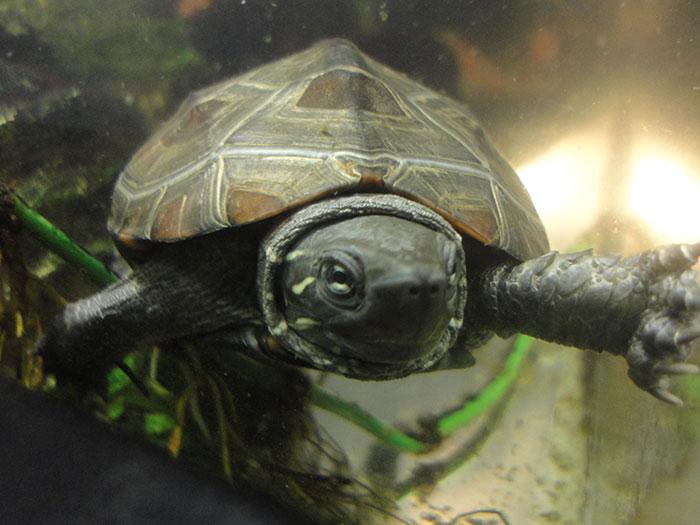
Amphibians, Reptiles and Salmonella
Thursday, August 25, 2016
Turtles, other reptiles and amphibians can carry Salmonella bacteria. They can carry this bacterium as part of their normal flora and may not exhibit signs of illness.
Aquatic turtles are the primary candidates for posing a risk due to the nature of their environment. It can be difficult to keep it clean. Bacteria flourishes in a wet environment and splashing water can increase the risk.
Here are some helpful tips for reptile and amphibian handlers or owners and their families:
- Keep your pet’s enclosure scrupulously clean. It is important for both human and animal health.
- Do not purchase or obtain turtles with shells that measure less than 4 inches in length for children under 5 years of age.
- Always wash your hands thoroughly with soap and water after touching or handling any amphibian or reptile, its housing, or anything that has come in contact with the animal including its food or feces.
- Children handling amphibians or reptiles should be closely supervised and assisted with hand washing.
- Children under 5 years of age, elderly people and people with weakened immune systems are at the highest risk of Salmonella infection.
- Amphibians and reptiles should not be kept in child-care centers.
- Reptile and amphibian pets should not be housed in children’s bedrooms, especially if the children are under 5 years of age.
- Do not allow amphibians or reptiles to roam freely throughout your house.
- It is especially important to keep reptiles and amphibians out of food and drink preparation areas.
- Do not bathe reptiles or amphibians in the kitchen sink or near any areas used for food or drink preparation. If you use a bathtub for this purpose, thoroughly clean and bleach it afterward to kill any bacteria that may remain on the surface.
When cleaning the reptile’s or amphibian’s habitat, follow these precautions:
- If possible, clean the habitat outdoors in an area not accessed by children, elderly or immunocompromised people.
- Do not clean the habitat near any areas used for food or drink preparation, near sources of drinking water or food such as gardens or crops.
- Children less than 5 years old should not be allowed to clean the reptile’s or amphibian’s habitat.
- After cleaning the habitat thoroughly wash your hands.
If you or a family member develops diarrhea, stomach cramps, fever, or other signs of illness, contact a physician. Be sure to tell your physician of your contact with a reptile or amphibian.
by Elisabeth Giedt, DVM
Veterinary Viewpoints is provided by the faculty of the OSU Veterinary Medical Hospital. Certified by the American Animal Hospital Association, the hospital is open to the public providing routine and specialized care for all species and 24-hour emergency care, 365 days a year.
